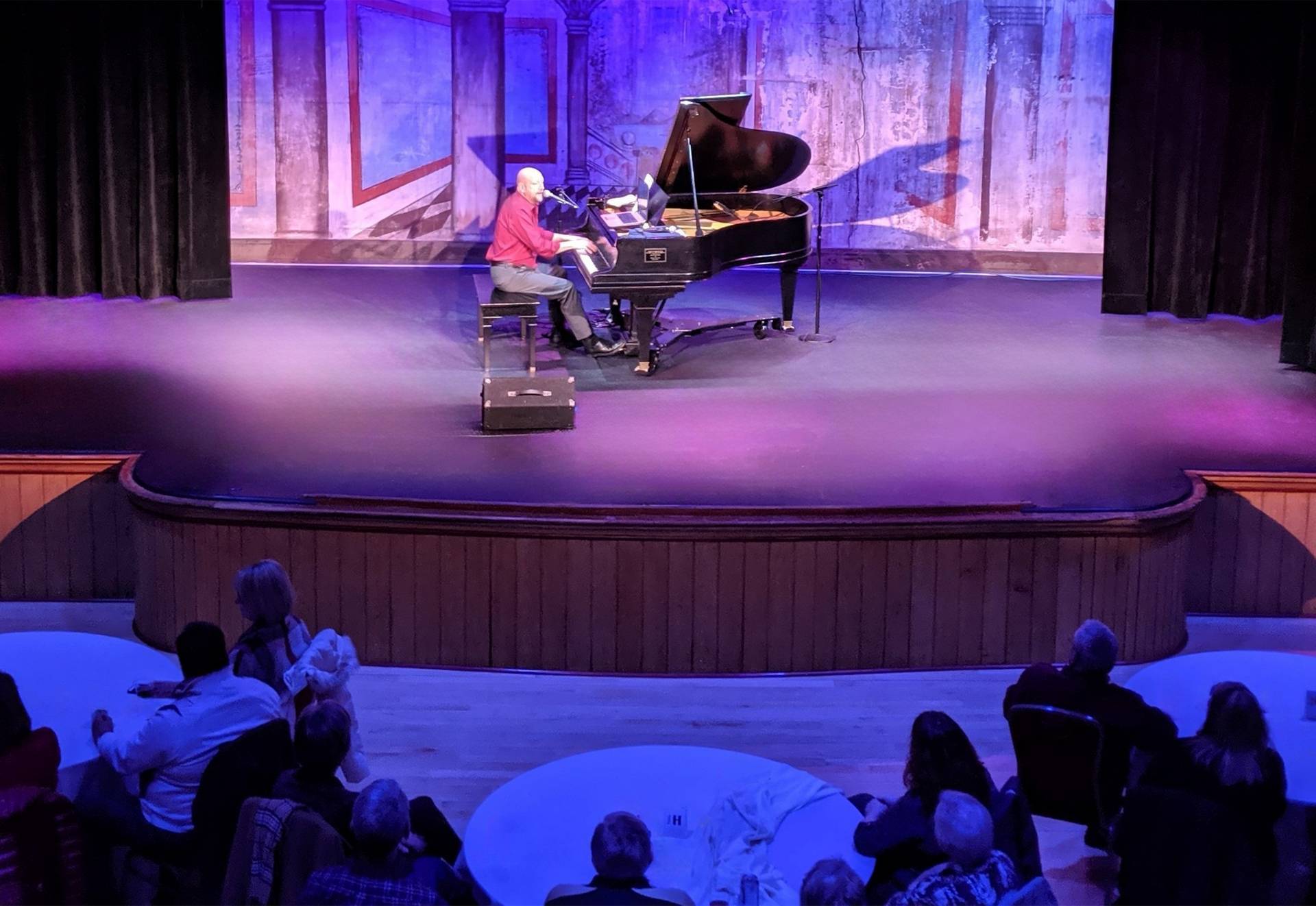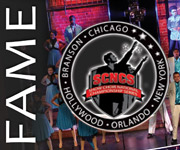
Lisa: You’ve made a living creating music. I think it’s so cool to make enough money to live a good life and do what comes naturally to you and you love to do.
Jeff: Yes, I’ve been blessed, in all avenues. I’m a performer, I’ve done dueling pianos, been music director for several shows in town and the Lilly Theatre at the Children’s Museum of Indianapolis, and arrange music for show choirs. As an independent artist, you have to divide yourself among different things. I learned that a very long time ago. Many hats.
Lisa: Many hats but all related.
Jeff: Many hats but all under the umbrella of music.
Lisa: Let’s talk about some of those hats. How did you get into show choir arranging?
Jeff: In the fall of 1987, I was contacted to arrange a piece of music for a school in Indiana. I don’t know how they got my information, but I wrote that one for them. Around that time I also played piano for Craig Tornquist, a comedian who would host competitions. I collected programs and started sending letters to high school show choir directors saying, ‘I’m new to the arranging thing, and if you’d like to give me a try we’ll work out something.’ I got three shows out of that. By 1990, I was writing a lot.
It was handwritten, so one arrangement would take about a week or more. I would write out all the individual parts. I would play it on a little keyboard, sing the vocal line, try the horns as chords to see if it might work. It took a long time and you really didn’t get to hear what it sounded like until it was on stage. It seems so archaic nowadays.
Lisa: That’s how we worked in the days before computers. What is different now?
Jeff: By 1995 I was using Finale on a computer. That changed the whole ball game. You could actually hear it played back. It was so revolutionary! And of course, it sounded like a rinky tink video game compared to now where they have such lush sounds even for basic midi playback. Now, in about 12 hours, I can write a full arrangement, using Finale 25.
Lisa: Are you solo or do you have other people working with you?
Jeff: It’s just me.
Lisa: How do you come up with your arrangements? What is the process, if a school comes to you?
Jeff: Like if someone says can you write Song ABC from Group XYZ and here’s what we want? They tell me what parts they want, the stop times, the chorus, the dance break, then verse one, then short dance break, etc. I write it, then they try it, and sometimes they come back and say we need something more here or there. I’m fine with an edit like changing a part or changing a key. The choir may have 26 altos and seven sopranos. It has to work for them. All of these things have to work so the kids get something out of it. You never know what’s going to blossom out of those little things.
Lisa: I like that philosophy. So this is custom work?
Jeff: Yes, and this is all work-for-hire because I am not the license holder for the song. I use someone else’s material and get paid for my work without ownership of the song. I have the right to be the arranger, and that’s where my rights start and end. I’m fine with that because I’ve had the opportunity to make a career of this.
My main goal is map it out. I start with an introduction. Then I write the melody line all the way to the end of the piece. I know where my start and end are. When there is a band break, I will write either a single horn line or chords. Then I put the words in, then the piano. It’s a building block system.
When I was writing by hand, it made it easier for me to write it all as I went. When you do that on a computer you really slow yourself down. Now I write one part at a time. And I always write a drum line over all of that as I’m going, because then when they get a preliminary mp3 of the arrangement, it’s the vocals, the piano, and the drum parts so they can feel those fills and the splashes with the cymbals. I also like to put in the popular essences of show choir. To me, there are mechanisms that should happen in the arrangement without being canned and that’s a fine line. To me, it’s at least one good vocal splash, particularly before the band break.
Lisa: I was wondering about musical trends in show choir. So with technology, you can take an arrangement that followed the trends of the time, say the early 2000s, and rearrange it with current trends.
Jeff: That’s a very good point. Years ago it was “make it big.” What I’ve learned over the years as a judge is when horns are playing all through the vocals, they have to sing over it. So I have gone back and wiped out a lot of my horn parts that I way overwrote.
Lisa: How did you get into adjudicating?
Jeff: One of the first clients I had in Indiana, after three years of working together, asked me to be a judge in her competition. She knew I had no experience judging and asked me anyway. That was 30 years ago and luckily I’ve been doing it every year since. She opened that door for me and I still work with her now and then when I judge north of Fort Wayne.
Lisa: On your website, showchoirmusic.com, there is a page dedicated to Thirst Project. Can you explain that?
Jeff: Thirst Project was started by a show choir kid and a friend of mine and very popular choreographer, Damon Brown. [He] started Show Choirs for Thirst. He has groups that do Miracle Minute fundraisers and they can raise money at competitions or concerts. That money goes to drill wells in very remote areas, where the source of water might literally be a muddy bog after a rain. It’s life saving and life changing! Damon remains very active with it—it’s a passion of his.
Lisa: What do you do for that project?
Jeff: I donate some of my sales and I pledge X number of dollars to Damon every year. I am really pleased to be part of it.
Lisa: Such an important cause! And it was started by a show choir kid. I saw a tab on jeffreybowenmusic.com that is titled “Llouie the Llama.” Tell us about LLouie.
Jeff: Years ago, I stayed with my brother and his wife when our dad was sick. Down the road was a cute little llama named Louie. I used to say “hey, hey, Louie” which became a song, which became a CD. It’s spelled with two L’s because he’s a llama. In my head I could see a music video. That got done this year and was released November 25 of this year and the stage musical opened on November 24.
Lisa: A musical?
Jeff: Yep! I wrote a script and some songs and submitted it to the Lilly Theatre and they chose to produce it. Llouie gets lost in the woods and all the woodland creatures help him find his way home. In fact, we’ve talked about having Llouie visit one of the villages Damon works with and tell a story. Once Llouie starts to get bigger, that will increase what we can give to that project.
Lisa: I love that! I also saw that you have a 22-year-old cat?
Jeff: Nix turned 22 the first of October. His bed has a heating pad under it. He’s a tiny wisp of a cat but he still jumps up on the bed and goes up and down the stairs.
I’ve had this wonderful life all these years. I grew up in the country and ran barefoot all summer long. I live right in the heart of Indianapolis now. I’m comfortable where I am.
Lisa: Your exuberance when talking about your work and life in general is very inspiring. Thank you so much, Jeff!!











